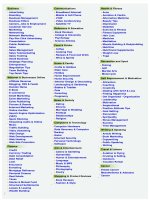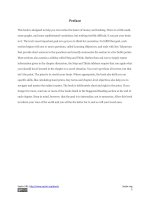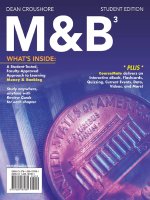Money and Banking: Lecture 36
Bạn đang xem bản rút gọn của tài liệu. Xem và tải ngay bản đầy đủ của tài liệu tại đây (338.39 KB, 16 trang )
Money and
Banking
Lecture 36
Review of the Previous Lecture
• Deposit Multiplier and Money Multiplier
• Central Bank’s Monetary Policy Toolbox
• Target Federal Funds Rate and Open Market
Operation
Target Federal Funds Rate and
Open Market Operation
• The central bank chooses to control the
federal funds rate by manipulating the
quantity of reserves through open market
operations: the central bank buys or sells
securities to add or drain reserves as
required.
Discount Lending, the Lender of Last
Resort and Crisis Management
•
•
Lending to commercial banks is not an
important part of the central bank’s dayto-day monetary policy.
However, such lending is the central
bank’s primary tool for ensuring shortterm financial stability, for eliminating
bank panics, and preventing the sudden
collapse of institutions that are
experiencing financial difficulties.
•
The central bank is the lender of last resort,
making loans to banks when no one else can
or will, but a bank must show that it is sound to
get a loan in a crisis.
The current discount lending procedures also
help the central bank meet its interest-rate
stability objective.
The central bank makes three types of loans:
•
•
•
•
•
primary credit,
secondary credit,
seasonal credit.
•
•
•
Primary credit is extended on a very shortterm basis, usually overnight, to sound
institutions.
It is designed to provide additional reserves
at times when the day’s reserve supply falls
short of the banking system’s demand.
The system provides liquidity in times of
crisis, ensures financial stability, and
restricts the range over which the market
federal funds rate can move (helping to
maintain interest-rate stability).
•
•
•
Secondary credit is available to institutions
that are not sufficiently sound to qualify for
primary credit.
Banks may seek secondary credit due to a
temporary shortfall in reserves or because
they have longer-term problems that they
need to work out.
Seasonal credit is used primarily by small
agricultural banks to help in managing the
cyclical nature of farmers’ loans and
deposits
Reserve Requirements
•
•
By adjusting the reserve requirement,
the central bank can influence economic
activity because changes in the
requirement affect deposit expansion.
Unfortunately, the reserve requirement
turns out not to be very useful because
small changes in the reserve
requirement have large (really too large)
impacts on the level of deposits.
• Today, the reserve requirement exists
primarily to stabilize the demand for
reserves and help the central bank to
maintain the market federal funds rate
close to target; it is not used as a direct
tool of monetary policy
The central bank’s Monetary Policy
Toolbox
Central bank
Central bank
Central bank
Linking Tools to Objectives
•
Desirable Features of a Policy
Instrument
•
•
•
•
Easily observable by everyone
Controllable and quickly changed
Tightly linked to the policymakers’ objectives
These requirements leave policymakers
with few choices, and over the years
central banks have switched between
controlling the quantity and controlling
the prices.
Central bank
Centra
l bank
Reserve targets
make interest
rates volatile.
Targets and Instruments
• Operating instruments refer to actual tools
of policy, instruments that the central bank
controls directly.
• Intermediate target refers to instruments
that are not directly under the control of
the central bank but that lie between their
policymaking tools and their objectives.
Targets and Instruments
• Over the last two centuries, central
bankers largely abandoned intermediate
targets, having realized that they didn’t
make much sense.
• Instead, policymakers focus on how their
actions directly affect their target
objectives









